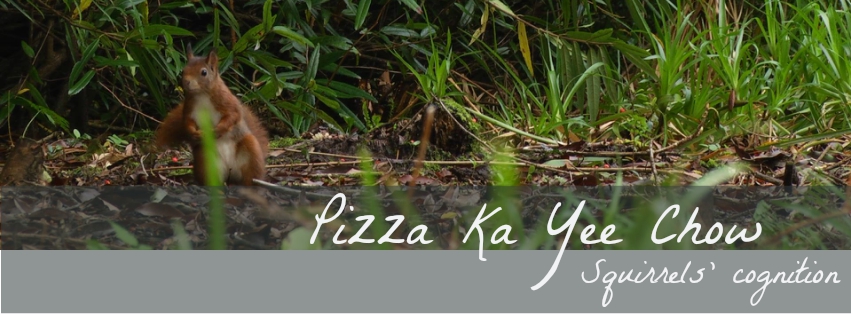I understand some scientists would say this is sentimental or not being objective in studying animal behaviour if we accredit or bond with our study species.
I disagree with them mainly due to two reasons: 1) being friends with, and working professionally with, non-human animals are two things – one shall learn to differentiate the two in different contexts (some non-human animals are not that dumb – they study your behaviours while you are study theirs, and thus, they know when to do their job); and 2) without them, without ‘success’ (productivity measures that are defined by science community).
So here are **My best buddies** 

Animal Behaviour and Cognition:
Krasheninnikova A*, Chow PKY*, Bayern A. (2020). Comparative cognition: practical shortcomings and some potential ways forward. Canadian Journal of Experimental Psychology, 74, 60-69.
Lea SEG, Chow PKY, Leaver LA, McLaren IPL. (2020). Behavioral flexibility: A review, a model, and some exploratory tests. Learning & Behavior, 48, 173-187. doi: https://doi.org/10.3758/s13420-020-00421-w
Lea SEG, Chow PKY, Meier C, McLaren IPL, Verbruggen F (2019). Pigeons’ performance in a tracking change-signal procedure is consistent with the independent horse-race model. Journal of Experimental Psychology: Animal Learning and Cognition , 45, 464-473. https://psycnet.apa.org/buy/2019-44416-001
Lea SEG Hempel de Ibarra N, Robert T. (2019). Inhibitory control and memory in the search process for a modifed problem in grey squirrels, Sciurus carolinensis. Animal Cognition, 22, 645-655. doi: https://doi.org/10.1007/s10071-019-01261-6
The repeatability of cognitive performance: a meta-analysis. the theme issue ‘Causes and consequences of individual differences in cognitive abilities’.
Chow PKY, Lurz PWW, Lea SEG (2018). A battle of wits? Problem-solving abilities in invasive Eastern grey squirrels and native Eurasian red squirrels. Animal Behaviour, 137, 11-20. doi: 10.1016/j.anbehav.2017.12.022
Chow PKY, Lea SEG, Hempel de Ibarra N, Robert T. (2017). How to stay perfect: the role of memory and behavioural traits in an experienced problem and a similar problem. Animal Cognition, 20, 941-952. doi: 10.1007/s10071-017-1113-7
Chow PKY, Leaver LA, Wang M, Lea SEG. (2017). Touchscreen assays of behavioural flexibility and error characteristics in Eastern grey squirrels (Sciurus carolinensis). Animal Cognition, 20, 459-471. doi: 10.1007/s10071-017-1072-z
Chow PKY, Lea SEG, Leaver LA. (2016). How practice makes perfect: the role of persistence, flexibility and learning in problem solving efficiency. Animal Behaviour, 112, 273-283. doi: 10.1016/j.anbehav.2015.11.014
Chow PKY, Leaver LA, Wang M, Lea SEG. (2015). Serial reversal learning in grey squirrels: learning efficiency as a function of learning and change of tactics. Journal of Experimental Psychology: Animal Learning and Cognition, 41, 343-353. doi: 10.1037/xan0000072
Dementia:
Cheng S-T, Chow PKY, Song Y-Q, Yu ECS, Lam JHM. (2014). Can leisure activities slow dementia progression in nursing home residents? A cluster-randomized controlled trial. International Psychogeriatrics, 10, 1-7.
Cheng S-T, Chow PKY, Song Y-Q, Yu ECS, Chan AC, Lee TM, Lam JH. (2014). Mental and Physical Activities Delay Cognitive Decline in Older Persons With Dementia. The American Journal of Geriatric Psychiatry, 22, 63-74.
Cheng S-T, Lam LC, Chow PKY (2012). Under-recognition of dementia in long-term care homes in Hong Kong. Aging and Mental Health, 16, 516-520.
Cheng S-T, Chow PKY, Chan ACM, Yu ECS. (2011). Leisure Activities Alleviate Depressive Symptoms in Nursing Home Residents with Very Mild or Mild Dementia. The American Journal of Geriatric Psychiatry, 20, 904-908.
Cheng S-T, Lee CKL, Chow PKY. (2010). Social Support and Psychological Well-being: Nursing Home Residents in Hong Kong. International Psychogeriatrics, 22, 1185-1190.
Mental Health and Sexual Orientation:
Chow PKY, Cheng S-T. (2010). Shame, Internalized Heterosexism, Lesbian Identity, and Coming Out to Others: A Comparative Study of Lesbians in Mainland and Hong Kong. The Journal of Counseling Psychology, 57, 92-104.
Details of my publications could be found on Google Scholar – here

